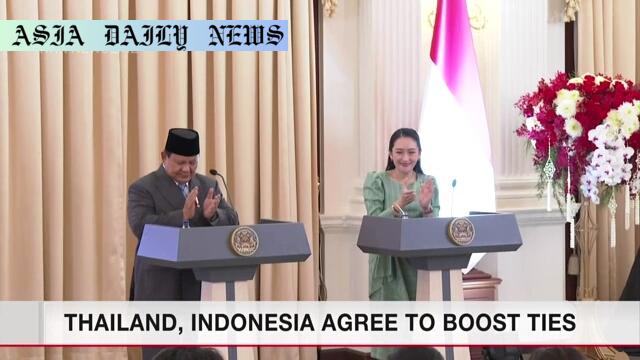Strategic Partnership: Thailand and Indonesia agree to deepen ties through collaborative efforts in security, economy, and combating transnational crimes.
Key Point 1: Thailand and Indonesia agreed to upgrade bilateral ties to a strategic partnership to bolster ASEAN leadership.
Key Point 2: Both countries will focus on deepened security cooperation through dialogue and leader-level visits.
Key Point 3: A joint effort will address transnational crimes, targeting online scams and human trafficking.
Key Point 4: The partnership reflects a broader trend in ASEAN for stronger inter-regional alliances to address global uncertainties.

Thailand and Indonesia Strengthen Diplomatic Bonds
Thailand and Indonesia have taken a significant step in their diplomatic journey, announcing the elevation of their bilateral relationship to a strategic partnership. This development, announced during a high-profile joint conference, marks a pivotal moment in the region’s political dynamics. Leaders acknowledged their shared history as founding members of ASEAN and reiterated their commitment to the organization’s goals amidst the backdrop of global economic and geographical uncertainty.
Thai Prime Minister Paetongtarn Shinawatra emphasized the importance of collective resilience, stating that as major economies in the region, Thailand and Indonesia bear a mutual responsibility to ensure a stronger ASEAN in the face of shifting global circumstances. This advancement comes not only as a reflection of their strengthened bilateral ties but also as an acknowledgment of the necessity for cooperative action in addressing emerging challenges in Southeast Asia.
Deepening Security Cooperation
Significant emphasis has been placed on the need for enhanced security collaboration between Thailand and Indonesia. President Prabowo Subianto highlighted the importance of closer agency-level dialogues and leader exchanges, which will foster better mutual understanding regarding defense and security issues. He stressed that this collaboration is essential, considering rising regional tensions and unpredictable developments globally.
A notable area of focus is combatting transnational crimes that have proliferated in the digital age. Online scams, cyber crimes, and human trafficking pose substantial threats within and beyond Southeast Asian borders. By aligning their efforts, Thailand and Indonesia aim to establish a robust framework that effectively tackles these critical issues, thus ensuring enhanced security for their citizens.
A Trend of Regional Partnerships in ASEAN
The ASEAN region has recently experienced a surge in the formalization of strategic partnerships among member countries. Events like Thailand-Vietnam’s earlier agreement and Vietnam-Singapore’s expansion of relations to a comprehensive strategic partnership underscore these valued efforts. Analysts point to growing geopolitical uncertainties and shifting foreign policies for the United States as drivers behind this regional trend.
Such alliances are expected to bolster the region’s stability, economic growth, and collective voice on the global stage. Thailand and Indonesia’s recent agreement further exemplifies the importance of these intra-regional partnerships, paving the way for a more resilient ASEAN in the future. Both leaders also agreed on the need for a unified approach to advancing ASEAN’s economic and diplomatic priorities on a broader stage.
Looking Ahead: The Road to Greater Regional Integration
As Thailand and Indonesia begin implementing their strategic partnership, the eyes of the region will be on how this collaboration evolves. Success in their joint initiatives, particularly in the security and crime-prevention sectors, could serve as a model for other ASEAN members to follow. Moreover, enhanced economic collaboration could fuel growth and development, benefiting not just these two countries but the entire region.
Ultimately, this partnership sends a strong message of regional unity. By fostering alliances through ASEAN, Southeast Asia positions itself as a formidable geopolitical bloc that prioritizes peace, human rights, and economic prosperity amidst an increasingly complex global landscape. The bond between Thailand and Indonesia is not just a testament to shared history but also a forward-looking strategy aimed at shaping the region’s future.



Commentary
A Unified ASEAN: A Vision for Greater Strength
The announcement of a strategic partnership between Thailand and Indonesia is undoubtedly a significant development for ASEAN as it seeks to navigate uncertain global dynamics. Southeast Asia has long been a region where cultural diversity and historical ties intertwine, forming a narrative of unity and cooperation. This recent agreement showcases the resolve of its member nations to support one another in addressing modern challenges and achieving shared goals.
Thailand and Indonesia are not just geographical neighbors but also economic and political allies with overlapping priorities. Their decision to focus on security collaboration, especially cybercrime and human trafficking, illustrates a pragmatic approach to contemporary threats. These are issues that transcend borders, making regional partnerships critical for effectively tackling them.
The Growing Importance of Resilient Collaboration
What makes this partnership particularly noteworthy is its reflection of ASEAN’s proactive strides towards strategic alignment and cohesion. In the past year, we’ve seen similar positive developments, such as Vietnam’s partnerships with Singapore and Thailand. These agreements bring into sharp focus the necessity for mutual support in an era where geopolitical shifts, economic turbulence, and environmental issues require collective responses over individual efforts.
Another vital takeaway is how these partnerships underscore ASEAN’s evolving importance on the global stage. By fostering internal strength through such collaborations, Southeast Asia is poised to have a greater voice in addressing international concerns, from trade and climate change to geopolitical stability.
Reflections on Regional Unity
The true test of these partnerships will be in their execution. While agreements and public declarations are headline-grabbing, the real progress lies in the steps taken to implement them. Enhanced security measures, collaborative economic strategies, and improved channels of communication will require sustained effort, trust, and transparency.
As an observer of diplomatic relations, one can only applaud the leaders of Thailand and Indonesia for recognizing the urgency of cohesion and taking tangible steps to cement it. ASEAN’s continued development rests on the shoulders of such partnerships, which not only solidify internal unity but also elevate the region as a whole on the international stage.